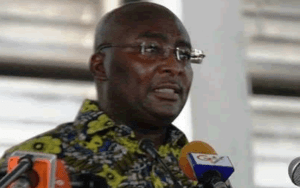Government will develop petroleum infrastructure into a hub – Bawumia

Vice President Dr Mahamudu Bawumia has underlined the Government’s vision of developing key petroleum infrastructure to make Ghana the hub of refined petroleum products within the West African sub-region and the continent as a whole.
He said the Petroleum Hub project would accelerate the growth of the country’s petroleum downstream sub-sector and make it a major player in the economy, and consequently ensure the development of sustainable value addition, wealth creation and progress of the industry.
“The Petroleum Hub project will increase the presence of major international oil trading and storage companies, create regional trading champions and encourage joint ventures between local and international companies for knowledge transfer and wealth creation,” Dr Bawumia said.
Vice President Bawumia said this when he delivered a keynote address at the second edition of the Ghana International Petroleum Conference in Accra held on the theme: ‘‘Realising the vision of a petroleum hub’’.
The four-day event, under the auspices of the Energy Ministry and Ghana Chamber of Bulk Oil Distributors, in collaboration with the National Petroleum Authority and Association of Oil Marketing Companies, brought together key stakeholders in the petroleum downstream sector, including policy-makers, regulators and oil service providers, to deliberate on policies and trends in the sector, as well as discuss pertinent issues affecting the industry in the bid to guide decision-making.
The participants are expected to come out with some recommendations to help resolve challenges in the petroleum downstream and chart the way forward.
Vice President Bawumia said the Nana Addo Dankwa Akufo-Addo-led government had plans of developing the country’s petroleum downstream with the goal of ensuring that crude oil produced locally was refined to add value as well as enhancing the petrochemical industry for accelerated national development.
He reminded the participants that the concept of a ‘Petroleum Hub’ was one of the government’s strategic anchor initiatives that would serve as the next pillar of growth for the Ghanaian economy.
“Developing Ghana into a ‘‘Petroleum Hub’’ for refined petroleum products is one of the important growth pillars envisaged for our economy.
It makes this conference a very useful one in discussing how Government’s vision can be translated into strategies and into realistic plans for implementation,” Vice President Bawumia stated.
The Vice President noted that, prior to the discovery of oil in commercial quantities in 2007, the country’s oil industry was dominated by downstream activities.
The industry had grown from one dominated by Government to a deregulated one, which accommodated both Government and private stakeholders, he said.
Dr Bawumia said: ‘‘The key milestone in the achievement of deregulation was in 2005, when the then President, John Agyekum Kufuor led Government to intensify efforts towards removing the bottlenecks and inefficiencies in the industry, which resulted in the enactment of the National Petroleum Act, 2005, (Act 691).
“The first phase of the deregulation implementation was to ensure private sector participation in the provision of downstream infrastructure and in the importation of petroleum products.
This was achieved when the Bulk Oil Distribution Companies (BDCs) were licensed to import petroleum products in the country.
“The second phase of our progress was price deregulation, which started in July 2015, with the aim of removing government controls in the pricing of petroleum products and allowing the BDCs and the Oil Marketing Companies(OMCs) to set ex-refinery and ex-pump prices respectively.
This has brought about some level of competition in the pricing of petroleum products in the country”.
Vice President Bawumia reminded them that after nearly a decade and half of deregulating the petroleum industry, it was time to take stock and identify key issues that would move the industry to the next level.
In that regard, he said, there should be a comprehensive review of the Deregulation Policy and its implementation to determine if the intended objectives had been achieved.
Dr Bawumia said: “The review should also focus on the petroleum products pricing formula. This is needed to ensure that areas of the formula that have not yet been deregulated, such as the transportation infrastructure of petroleum products in all its forms, can be reviewed and deregulated to enhance competitiveness and market efficiency.
This I believe can lead to a reduction in prices of petroleum products’’.
He urged petroleum service providers, especially the bulk distribution companies (BDCs) to develop their capacity to compete favourably and competitively with multinational companies and become multinationals within the sub-region.
To that end, he encouraged the BDCs to consider consolidating their businesses instead of going solo in order to be listed on the Ghana Stock Exchange to raise the needed capital to expand their businesses and venture into other markets.
“Mergers should not be seen as a step to loss of ownership, but rather as a strategy to enhance growth and competitiveness in the long run.
Take a cue from the breweries and the telecommunication companies,” Dr Bawumia advised.
He, therefore, welcomed the move by the Energy Ministry for developing a Financing Policy for the Petroleum Downstream Industry with the aim of enhancing the capacity of petroleum service providers to transition into the next level.
Source: GNA
